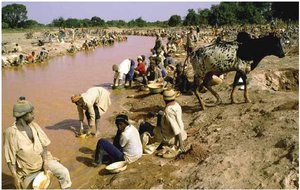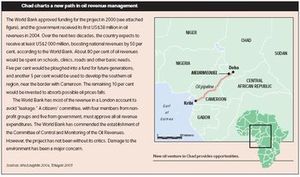Mining and oil extraction in Africa
Globally, mining has played a key role in driving the economic development (Economic change in Africa) of many countries in the world, including South Africa, Australia, Canada, Sweden and the United States. Many of the world’s richest countries have extensive minerals industries, which they have used as a platform for broad-based industrial development.
For a region rich in minerals, mining provides many opportunities to support sustainable development. The region contains about 30 percent of the Earth’s mineral reserves, including 40 percent of gold, 60 percent of cobalt and 90 percent of platinum. In the Southern African Development Community (SADC), for example, the mining industry contributes about 60 percent of foreign exchange earnings, 10 percent of gross domestic product (GDP) and 5 percent of employment. The economies of Angola, Botswana, the DRC, Namibia, South Africa, Tanzania, Zambia and Zimbabwe get between 22 percent and 90 percent of their foreign exchange directly from mining and mineral exploitation.
However, the environmental costs of mining can be massive in terms of land conversion and degradation (Land degradation and desertification in Africa), habitat conversion and groundwater pollution. A major by-product of large-scale mining is large volumes of waste and chemical pollution, which may have devastating impacts on ecosystems. Acid drainage has been described as the most pervasive problem associated with waste dumps.
The effects of mining and smelting that occurred over past decades, centuries, or even millennia prove that some impacts can be long-term, forcing society to continue to pay for natural capital stocks that have been drawn down by past generations. Due to the long-lasting impact of mining, many governments have, since the 1990s, enacted environmental impact assessment (EIA) policies and laws. This has helped countries to make a better evaluation of the benefits and costs associated with mining and to adopt measures to avoid and mitigate harmful impacts. South Africa, for example, undertook an EIA of a proposed mining venture of titanium along the eastern shores of St Lucia, an area renowned as a valuable source of biological diversity. A review panel, which was charged to determine whether mining would be compatible with nature conservation and tourism, concluded that there was no compatibility. As a result, mining permission was refused and in 1999 the area was declared a World Heritage Site.
Africa is a significant player in oil production. All subregions of Africa are crude oil exporters, except Eastern Africa, but this could change given the recent discovery of crude oil reserves in Sudan.
In 2003, Africa produced 8.7 million barrels per day (bbl/d) of oil with the top producers being Nigeria, Algeria, Libya, Angola and Egypt. Total African oil consumption in 2003 was 2.7 million bbl/d and the top oil consumers were Egypt, South Africa, Nigeria, Libya and Algeria. In 2002, South Africa was the largest net crude oil importer in Africa, followed by Morocco.
In the Great Lakes countries of Burundi, Kenya, Rwanda, Tanzania and Uganda, oil consumption averaged about 91,000 bbl/d in 2001, virtually all imported. Kerosene is used extensively in rural areas for lighting and, in urban areas, for cooking and lighting.
Oil has been a key factor in the positive economic growth (Economic change in Africa) Africa has experienced, with key oil producers showing impressive growth: Chad grew at 39.4 percent and Equatorial Guinea at 18.3 percent. Similarly, the overall impressive growth rates in Central Africa and Northern Africa are directly linked to oil. The full potential of the oil resources, which fuelled economic development in these countries and the rest of the region, however, is yet to be realized. The irony is that in many cases, these resources have often contributed to environmental degradation and civil conflict. An increasing number of countries are establishing governance and institutional systems that promote social investment. In Chad, for example, the government, in collaboration with the World Bank and non-profit organizations, agreed to ensure that oil revenues benefit poor people. This project faces various challenges regarding agreement on exactly which sectors should benefit from the profits.
Further Reading
- ECA, 2005. Economic Report on Africa 2005: Meeting the Challenges of Unemployment and Poverty in Africa. Economic Commission for Africa, Addis Ababa.
- Energy Information Administration, 2005. International Energy Annual 2003: 1.2 World Petroleum Consumption 1980-2003.
- IIED and WBCSD, 2002. Breaking New Ground: Mining, Minerals, and Sustainable Development – the Report of the MMSD Project. International Institute for Environment and Development and World Business Council for Sustainable Development. Earthscan Publications Ltd, London.
- UN, 2002. Summary of the economic and social situation in Africa, 2001: Recent economic trends in Africa and prospects for 2002. United Nations.
- UNEP, 2006. Africa Environment Outlook 2
|
|
| Disclaimer: This article is taken wholly from, or contains information that was originally published by, the United Nations Environment Programme. Topic editors and authors for the Encyclopedia of Earth may have edited its content or added new information. The use of information from the United Nations Environment Programme should not be construed as support for or endorsement by that organization for any new information added by EoE personnel, or for any editing of the original content. |

